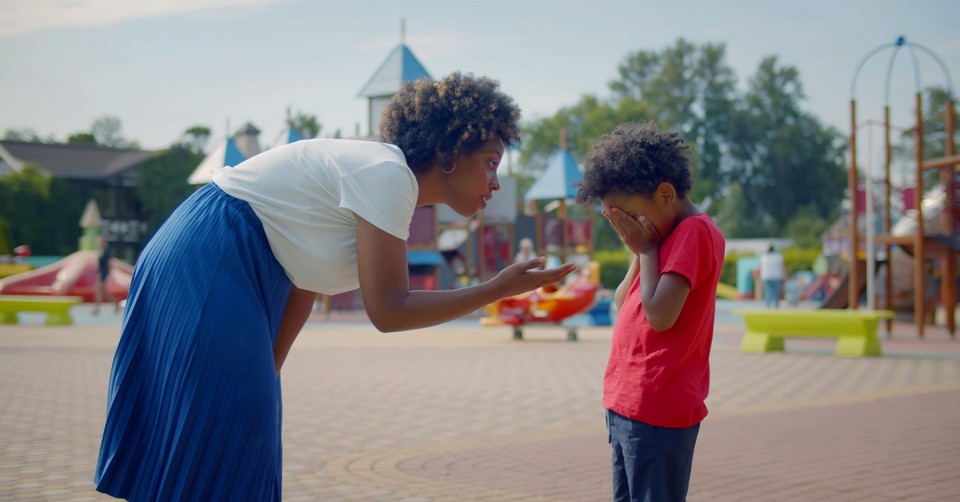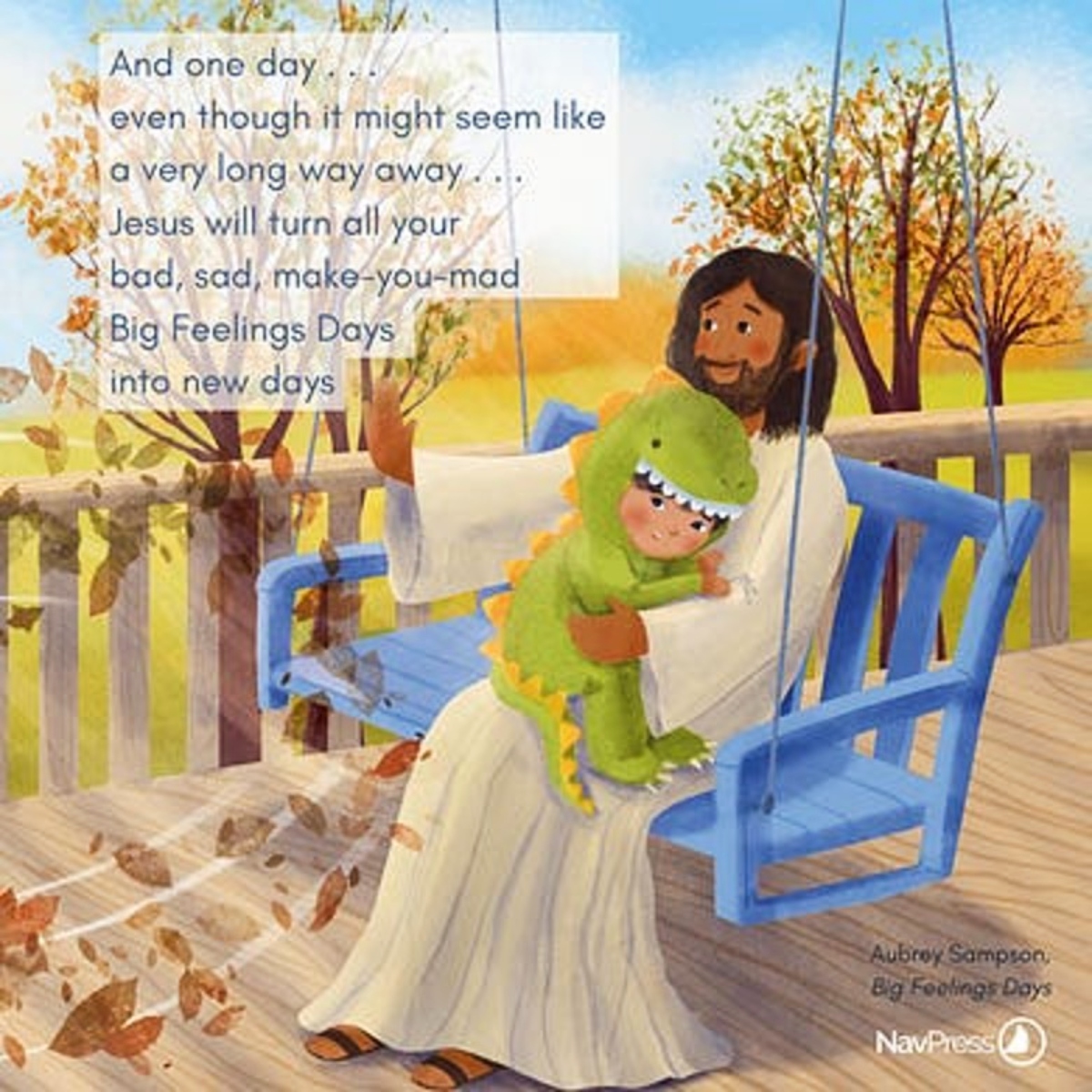6 Ways to Help Children with Big Feelings

When we face tragedy, trauma, or other major life transitions, our grief doesn’t happen in a void or vacuum.
We are often surrounded by little ones we love — kids or grandkids, nieces or nephews, children at your church, or even children of our hurting friends who are also dealing with pain, hard things, and big feelings.
Yet, because of our own overwhelming emotions, we may feel under-resourced in how to walk with these kids or help the hurting children we love.
Thankfully, there are several, tangible ways we can help little kids with big feelings:
1. Give Kids Good Language
It’s essential to teach our kids age-appropriate language, terms, and words to describe their “big feelings.” Help children know how to recognize and say things like, “I feel sad,” or “I am mad.” Or even, “I am having a bad day.”
When children can learn to recognize their emotions, in simple age-appropriate statements, this language can help bring healing, and help them grow in their emotional intelligence and compassion for others.
2. Introduce Complicated Emotions Using Simple Metaphors
Ask the kids you care for questions about how their bodies feel, using language they might understand. For example, adults might say, “I feel depressed,” or “I am struggling with anxious thoughts.”
With children, it’s very helpful to introduce the concept of complicated emotions using child-friendly, body-emotion language.
For instance, “Do you feel so mad you want to stomp around like a dinosaur?” “Do you feel sleepy like a brown bear in winter?” “Do you feel busy like a buzzing bee?”
When children can name what their big feelings are doing in their bodies, they can begin to regulate their nervous systems.
3. Remind Children That God Loves Them, Including Their Big Feelings
Teach the little ones you love that God loves them and all of their big feelings. It’s so important for children to know they can safely express their big emotions to you, and to God — and that Jesus is right here with them.
He loves them and their big feelings, too, and he can help carry their feelings when they feel too heavy or too hard.
If you create home environments where children feel safe to express the full gamut of emotions in healthy ways, then they will grow up to know they can honor their emotions and bring them to God as emotionally healthy adults.
4. Teach Kids Tangible and Creative Ways to Express Their Emotions
Give the kids you love tangible and creative ways to express their feelings to Jesus. Encourage them to draw a picture, make something with clay, or inhale and exhale slowly and deeply, as if they are blowing out birthday candles on a cake.
Helping children do something active with their big feelings, in ways that make sense to them and their developmental stages, is a healthy way to help them process their emotions.
5. Remind Kids of Gospel Hope
Remind children of our gospel hope — that Jesus loves them and can relate to their big feelings because he has big feelings, too. Jesus got mad, sad, and even had bad days himself.
Remind them of the truth from Revelation 21 — that one day, all of our bad, sad, and make-you-mad days will turn into good days, because of God’s love for us in Jesus, and Jesus’ promise of making all things new.
6. Gather Kid-Friendly Emotional Resources
As you are looking for more meaningful ways to encourage and help the little ones with big feelings in your life, be sure to gather children’s literature on emotional health.
In fact, I would love to invite you to order a copy of my newest children’s Book, Big Feelings Days: A Book about Hard Things, Heavy Emotions, and Jesus’s Love.

Big Feelings Days was born after a beloved family in our church walked through a painful tragedy.
They have three precious little ones who, as you can imagine, were grieving their own losses and big feelings during that time. Sadly, I couldn’t find many resources directed specifically toward their tender hearts.
I often write and speak on lament and loss for adults, but I really wanted to provide something, a sort of lament for little ones.
I wanted caregivers and parents to have meaningful tools for tending to the biggest feelings of the littlest people in their lives.
And I wanted the “big feeling kids” in my own life to know that Jesus had big feelings, too, and that Jesus wants to carry our big feelings.
With that, Big Feelings Days: A Book about Hard Things, Heavy Emotions, and Jesus’s Love was born.
I talked with children’s therapists and other experts in the making of this resource, so it has tested, practical, and creative ideas for hurting kids — coupled with sweet ways they can learn to express their big feelings to Jesus.
It's also filled with the promise of Jesus' presence in our suffering and the hope that one day, all tears will be dried, and all pain will be ended (Revelation 21).
This book is particularly special to me, a personal project in a lot of ways. I saw the final cover art the very same week my best friend Jenn was placed on hospice, after her two-year battle with breast cancer.
So, I have a lot of big feelings myself as this book launches into the world. I don’t understand it all, but I know this is somehow wrapped in God’s love and the Spirit’s timing.
I truly believe this book, geared towards kids ages three to seven, will be a beloved and helpful resource to children who are hurting, angry, or just have a lot of Big Feelings.
With its beautiful illustrations, Big Feelings Days will also encourage kids that Jesus loves them and is right next to them, no matter what they feel.
Ultimately, Big Feelings Days is a reminder to you — that God loves you and your big feelings too.
For further reading:
How Are Children Gifts from God?
7 Ways to Pray for Your Children
Why Is the Identity of Children So Important?
Can Children Truly Understand the Bible?
Photo Credit: ©iStock/Getty Images Plus/Nimito


Originally published June 12, 2024.





